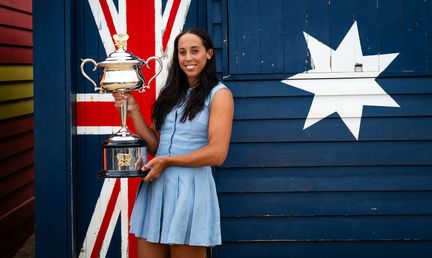SINGAPORE - Martina Navratilova joins the WTA Insider Podcast from the BNP Paribas WTA Finals Singapore presented by SC Global to discuss a broad range of topics, from her biggest surprises of the season to a discussion surrounding a topic that has once again reared its head:
What's more difficult, winning a Slam or finishing the season at No.1?
"I think finishing the year No.1, because you have to be really consistent," Navratilova said on the Insider Podcast. "You have to be great, excellent, and consistent. At a Slam, you can just get hot for two weeks and get it. Of course now there's more emphasis on the majors, so if you can just hold your nerve for two weeks it's a lot easier to win that one tournament than to win five, six, or seven tournaments for the year and have a better season overall than everybody else.
"To be No.1 you have to be better than everybody else. To win a Slam you just have to be better than seven players."
Hear more from the 18-time major champion below:
More excerpts from Navratilova's turn on the Insider Podcast:
WTA Insider: What's been the biggest surprise of 2017 for you?
Navratilova: It has to be Ostapenko winning the French Open and Sloane Stephens winning the US Open is a close second. Particularly as injured as she was, she was on crutches for the better part of the Spring, and she comes through and wins the US Open out of nowhere. And Ostapenko literally came out of nowhere. She wasn't even seeded. So two big surprises there.
And the way Ostapenko won, coming back in both the second and third sets against Halep was just astonishing.
WTA Insider: Halep played near-perfect percentage tennis in that final. That contrast between that percentage tennis vs. audacious hitting was a stunning thing that day.
Navratilova: Percentage tennis gets you the No.1 ranking but it doesn't get you the majors because then you come up against somebody that's hot and then you have to play a little more than percentage tennis. Simona pulled back just a little bit, a set and 3-0 and she had break points for two breaks up, and she played it careful and you cannot player careful. She was playing percentage tennis but she was still going for her shots when she had her opportunity. On those big moments, she pulled back and she paid the price. After that, she did get better on those big points. But again, percentage tennis will get you so far, but it can't win you majors for the most part.
WTA Insider: Why do you think there has been a philosophical shift over the years to emphasize Slams over performance on the tour level?
Navratilova: Money. Prize money. That's what people pay attention to. In my day, we were making more money at a regular tournament than we did by winning at a major. And that was one week, by the way, as opposed to two weeks at a major. The discrepancy was even greater then. I would win $30,000-$40,000 in a week winning the Virginia Slims, and I would win Wimbledon and I would get $25,000. That's when the Slams started putting in more money and more PR and got on TV more and all this, and just got more attention and players started talking about it more and if you didn't win a major it was considered a bad year.
It started shifting in the late 80s and the 90s, and now the tour, to me, has taken a beating. It doesn't seem to matter as much. And also there are just more players who can win, so it diluted the quality of the rivalries and head-to-heads, and now it's more about who wins a major.
WTA Insider: One one hand, I can understand how it might be easier to market the sport to casual fans if it only involves four big tournaments. On the other hand, the tour is the backbone of the sport. How do you reconcile the two?
Navratilova: It's tricky because you never have a good fan as the one who sees it live and you can only do that in so many places. The majors are just four tournaments and we support the tour throughout the year in so many different countries, so many continents, and that's when people can get close to the players and develop a rapport, and get behind somebody. It's a tricky proposition, but right now it's gone too much the way of the majors for my taste.
It's like you only have the playoffs and no regular season. The regular season is what establishes the tour, it's the strong middle class, and you can have the elite win the Slams. It's a balancing act but right now it's gone a little too much one way, but that's how it goes sometimes.
WTA Insider: Is it just up to the players to provide more stability across the board? Or is there something institutionally that can be done to change things?
Navratilova: I think the players really lead the way here, by their effort, by being more consistent, playing better in regular tournaments and talking them up. You have to build them up yourself. You can't say I don't mind what happens after you lose a match, and say I just want to be sure I'm 100% for the French Open.
No, this is not a warm-up. This is not a warm-up event. It's an event. So take a little more pride in the tour because without that, you've got nothing.
The warm-up is the practice. The practice week or exhibition is the warm-up. A tournament is not a warm-up. Maybe you pay a little more attention to your body and if something is hurting you then you take the week off because you don't want to be hurt for Wimbledon or the French Open.
But to not really put everything on the court mentally and physically when you're playing that match, that's inexcusable. It doesn't work. Even during the match you always have to try for every point, every game, every set. You can't say after you get down 0-4, you let this one go and try for the third set. It doesn't work that way and it doesn't work that way in regular tournaments to say 'Oh, I'm going to turn it up at the US Open.' It doesn't work that way. You've got to treat every match the same way.
Listen to the full Legends Corner episode of the WTA Insider Podcast to hear the full interview.
Subscribe to the WTA Insider Podcast on iTunes and any podcast app of your choice to ensure you receive every new episode when they go live.


![[4] Wang Xinyu d. [Q] Jil Teichmann 6-7(5), 7-6(5), 6-4, Singapore QF (3:19). There was just one break of serve in the whole match -- Wang capturing the Teichmann delivery in the first game of the third set.](https://photoresources.wtatennis.com/photo-resources/2025/01/31/d91dedfc-6f1e-4bdb-a9a1-eeb92c407133/Wang-Xinyu-QF-2.jpg?width=451&height=268)




